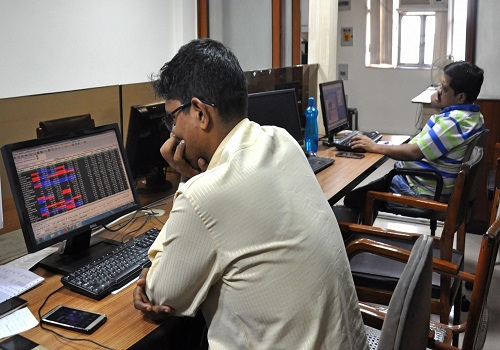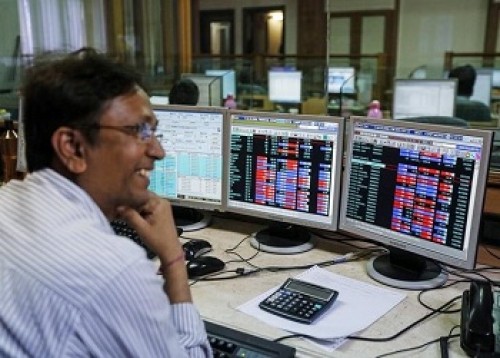Opening Bell : Domestic indices likely to get cautious start amid uncertainty of US rate cut timing

Follow us Now on Telegram ! Get daily 10 - 12 important updates on Business, Finance and Investment. Join our Telegram Channel
Indian markets ended lower on Tuesday amid ongoing geopolitical uncertainty for the second consecutive day. Markets remained closed on Wednesday on account of Ram Navami. Today, domestic indices are likely to get cautious start amid uncertainty of US rate cut timing and precarious situation in the Middle East (Iran-Israel) region. Rising US treasury bond yields, which shot to a five-month high, also likely to weight on investors' risk appetite. Foreign fund outflows likely to dent sentiments. Foreign institutional investors (FIIs) net sold shares worth Rs 4,468.09 crore on April 16, provisional data from the NSE showed. However, some support will come as the International Monetary Fund raised India’s FY25 GDP growth forecast by 30 bps to 6.8 percent from its January forecast of 6.5 percent, citing bullish domestic demand conditions and a rising working-age population. With this, India continues to be the fastest growing economy of the world, ahead of China's growth projection of 4.6 percent during the same period. Also, industry body PHDCCI said India's economy is estimated to grow at 8-8.3 per cent in the current fiscal. It added the country's GDP will grow at an average of 6.7 per cent over the next 23 years to become a $34.7 trillion economy by 2047, with a per capita income of $21,000. Besides, UN Trade and Development (UNCTAD) in its report said that India grew by 6.7 per cent in 2023 and is expected to expand by 6.5 per cent in 2024, continuing to be the fastest-growing major economy in the world. It added that the expansion in 2023 was driven by strong public investment outlays as well as the vitality of the services sector which benefited from robust local demand for consumer services and firm external demand for the country's business services exports. Traders may take note of report that India's crude oil import dropped 16 per cent in the fiscal year ended March 31 as lower international rates but the dependency on overseas suppliers rose to a new high. India imported 232.5 million tonnes of crude oil, which is refined into fuels like petrol and diesel, in the 2023-24 fiscal (April 2023 to March 2024), almost the same as in the previous financial year. But it paid $132.4 billion for the imports in FY24 as against $157.5 billion import bill in 2022-23. Stocks related to space sector will be in focus as the government has notified amendments to the foreign direct investment policy in the space sector to attract offshore investors in satellite manufacturing and satellite launch vehicles segments. There will be some reaction in road industry related stocks as rating agency Icra said road execution in India is likely to grow 5-8 per cent to 12,500-13,000 km in the current fiscal, after recording a robust expansion of 20 per cent in 2023-24. Meanwhile, Infosys, Bajaj Auto, HDFC Life Insurance, ICICI Securities, Mastek, National Standard (India), Network18 Media and Investments, Oriental Hotels, Swaraj Engines, TV18 Broadcast, and Accelya Solutions India are scheduled to report their March quarter results during the day.
The US markets ended lower on Wednesday after US Fed officials including Fed chief Jerome Powell backed away from providing guidance on when rates may be cut, and instead hinted of a likely higher-for-longer regime. Asian markets are trading higher on Thursday shrugging off a weak lead-in from Wall Street as investors bet on a strong earnings report from top chipmaker TSMC to spur a rally in technology.
Back home, Indian equity benchmarks continued their decline for the third consecutive session on Tuesday, tracking losses in Asian markets due to escalation in the Israel-Iran conflict. Heavy selling in IT and TECK stocks also dented investors' sentiment. Key gauges made a negative start and remained under pressure for whole day as traders were anxious with provisional data from the NSE showing that foreign institutional investors (FIIs) net sold shares worth Rs 3,268 crore on April 15, 2024. Traders were concerned with report that India’s merchandise exports dipped marginally in March to $41.69 billion, and by 3.11 per cent during the last fiscal year to $437.06 billion mainly due to continued geopolitical turmoil, and depressed global trade. Imports, too, declined in March as well during the entire 2023-24. Traders took a note of former Reserve Bank Governor D Subbarao’s statement that even after becoming the third largest economy in the world by 2029 as envisaged by Prime Minister Narendra Modi, India may still be a poor country and therefore there is no reason for celebration. Key gauges extended losses in afternoon session amid a private report stating that interest rate cuts in India are off the table in fiscal year 2024/25 given the change in the Federal Reserve's policy path and strong growth in the South Asian nation. Adding some worries, the Indian government has announced an increase in windfall tax on petroleum crude from Rs 6,800 to Rs 9,600 per metric ton. This change will come into effect on April 16, as part of the government's fortnightly revision of the tax. But, diesel and aviation turbine fuel will remain unaffected and will continue to have a zero windfall tax rate. However, markets managed to trim some losses in final hour of trade, as traders took some support with India Meteorological Department’s (IMD) statement that India is likely to experience above-normal cumulative rainfall in the 2024 monsoon season with La Nina conditions likely to set in by August-September. IMD predicts 2024 southwest monsoon season (June to September) rainfall over the country as a whole to be above normal (>104% of the Long Period Average (LPA)). Seasonal rainfall is likely to be 106% of LPA with a model error of ± 5%. LPA of monsoon rainfall (1971-2020) is 87 cm. Finally, the BSE Sensex fell 456.10 points or 0.62% to 72,943.68 and the CNX Nifty was down by 124.60 points or 0.56% points to 22,147.90.
Above views are of the author and not of the website kindly read disclaimer










Tag News

Indian markets to deliver positive returns for 9th year in a row, outperform US



More News

The ongoing rally is expected to exhaust around 21040 - Tradebulls Securities





 320-x-100_uti_gold.jpg" alt="Advertisement">
320-x-100_uti_gold.jpg" alt="Advertisement">




